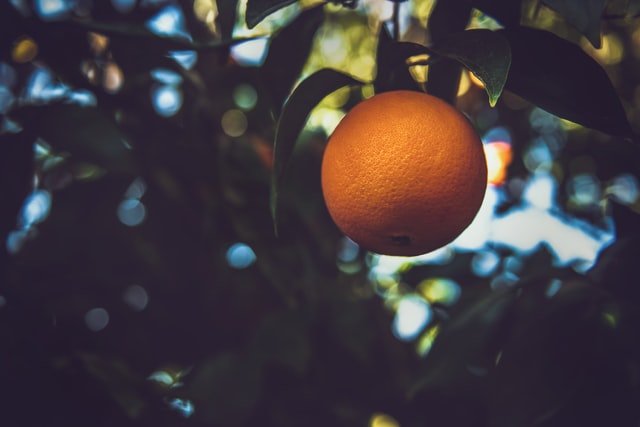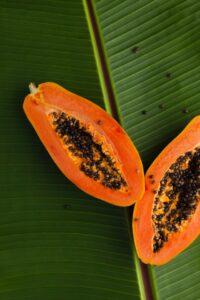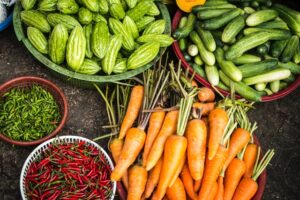How does organic food benefits children?
- Published on:
- Last update: 09 October 2023

Every time the topic of healthy eating comes up, the term organic seems to pop up. Nutrient-dense organic foods are well known to offer the best nutritional value. With the increase in the use of genetically modified organisms, in which one species is infused with DNA, organic food and organic food benefits have become an increasingly important issue. People have always returned to nature after going against nature.
Mothers are advised to nurse their newly born babies when they are taken for an excellent reason. Good nutrition is essential for the development of a young child. Parents must choose the right type of food for their children. Organic food is well documented to be beneficial for both babies and toddlers, and there are several articles on the subject. Organic food benefits are numerous.
Organic food benefits

To understand why toddlers need organic food, here are a few reasons. Organically-grown food contains fewer pesticides and herbicides.
A child’s immune system is not completely developed when they are still babies and toddlers, so chemicals present in genetically modified food can interfere with their health. The health of babies is seriously threatened by foods that are not organic. In addition, babies are more likely to be exposed to chemicals than adults. Due to their small size and relatively low weight, infants are more likely to be exposed to chemicals.
Organic foods are free of GMOs
Even though most of what we eat is converted in our bodies to build organs and tissues, this will still have a detrimental effect on the structure and function of growing bodies. Nobody wants to subject their babies to food that has been altered. The baby’s immune system could be weakened as a result. The organic food benefits are that it is free of GMOs.
Organic food is fresh.

Many preservatives are added to packaged foods that aren’t fresh and are sold in supermarkets. Preservatives can cause childhood behavioural issues in toddlers, such as hyperactivity. Babies and toddlers benefit from the high amount of nutrients in fresh food and get a better source of nutrition from it. It is hard to get fresh products but one of the main organic food benefits is that it is fresh.
Your mental and emotional health and the environment can be affected by the way food is grown. People with allergies to foods, chemicals, or preservatives may find that their symptoms decrease or disappear by eating only organic foods. The nutrients in organic foods are typically higher than those in conventionally-grown foods.
Pesticides are less abundant in organic produce. Traditional farming uses a wide range of chemicals such as synthetic fungicides, herbicides, and insecticides, and the residues remain in the food we eat.
Organic food generally tastes better because it does not contain preservatives which prolong its shelf life. Sometimes organic produce is grown on smaller farms nearer where it is sold (but not always, so pay attention to the farm where it’s grown).
The environment tends to be better off with organic farming. By using organic farming practices, farmers may reduce pollution, conserve water, reduce soil erosion, increase soil fertility, and use less energy. As well as being better for nearby birds and animals, farming without pesticides is also healthier for nearby residents.
Antibiotics, growth hormones, and animal by-products are not used organically to raise animals. The consumption of animal by-products increases the risk of mad cow disease (BSE), and the use of antibiotics can lead to the development of antibiotic-resistant bacteria. As a result, organically raised animals have more room to roam and access the outdoors, which keeps them healthy.
GMOs are not present in organic food. Plants whose DNA has been altered to resist pesticides and produce insecticides have been genetically modified or referred to as genetically engineered foods (GEs).
Does it mean organic pesticide-free?

Organic food has the significant benefit of having lower pesticide levels, as mentioned above. Although organic farms use pesticides, they are not free from their use. Organic farms use only naturally-derived pesticides instead of synthetic pesticides as opposed to commercial farms. Natural pesticides have the reputation of being less toxic, but some have been found to pose health hazards. Thus, eating organic will allow you to reduce your exposure to harmful pesticides. Organic food benefits extend beyond the fact they are pesticide-free.
What are the potential risks of pesticides?

Because a great deal of pesticide exposure has built up in our bodies over many years, we have an accumulated build-up of pesticides. It may cause headaches, congenital disabilities, and increased stress on an already weakened immune system, as well as cause a chemical “body burden.”
In some studies, even low levels of pesticide usage have been associated with increased risks of various cancers, including leukaemia, lymphoma, brain tumours, breast cancer, and prostate cancer.
The immune system, body, and brain of children and fetuses are still developing. Thus, they are most susceptible to pesticide exposure. Children exposed to early environmental toxins may suffer developmental delays, behavioural disorders, autism, immune system alterations, and motor disorders.
Pregnant women are at greater risk from pesticides due to the stress pesticides add to their already overworked organs. Furthermore, pesticides can pass from mother to child through the womb and breast milk.
The importance of organic labelling when it comes to fruits and vegetables
The following fruits and vegetables contain the highest level of pesticides, so organic versions are preferred:
- Apples
- Cucumbers
- Sweet Bell Peppers
- Celery
- Grapes
- Potatoes
- Cherry Tomatoes
- Summer Squash
- Kale/Collard Greens
- Nectarines (imported)
- Spinach
- Hot Peppers
- Peaches
- Strawberries
Buying organic fruits and vegetables isn’t necessary.
Pesticides are generally not used on these conventionally-grown fruits and vegetables called the Clean 15:
- Asparagus
- Mushrooms
- Avocado
- Cabbage
- Eggplant
- Sweet Corn
- Kiwi
- Mango
- Onion
- Pineapple
- Papaya
- Sweet Peas (frozen)
- Grapefruit
- Sweet Potatoes
- Cantaloupe
Consider buying organic meat, eggs, and dairy products if you can
Agriculturally raised animals feed soybeans, grains, antibiotics, growth hormones, pesticides, and sewage sludge. Animals subjected to these practices and people who consume their meat, eggs, or milk may suffer serious health consequences. Organic food benefits are significant.
Whenever possible, purchase beef and dairy products that are said to be “pasture-raised” or “100% grass-fed.” For pork, chicken, and eggs, select certified organic products. It may be possible to afford eating organic without compromising your food budget by buying cheaper cuts of meat from organically raised animals. If you’d like to buy organic chicken thighs instead of conventional chicken breasts, try doing so.
Organic food buying tips

Seasonal purchases are best. In season, fruits and vegetables are the most affordable and fresh. To make sure you’re buying the freshest possible food, find out when your market’s produce is delivered.
Consider your options. You can compare prices at the grocery store, the farmers’ market, online and even in the freezer aisle for organic products. Sometimes the organic food benefits outweighs the cost of the product. It is better, in the long run, to opt for the organic food benefits.
Having organic food does not always mean that it is healthy. We often make junk food sound fit in the food industry, but organic baked goods, desserts, and snacks are often very high in sugar, salt, fat, or calories, even if they’re organic. You should read the ingredients carefully.
It is essential to remember a few key things when deciding between organic food and GM food. Even though organic food is quite expensive, it is better to invest in the health of your offspring today than to channel the same money later into their treatment should they become ill.
Shop at Yummy Valley Now
Share this post:

